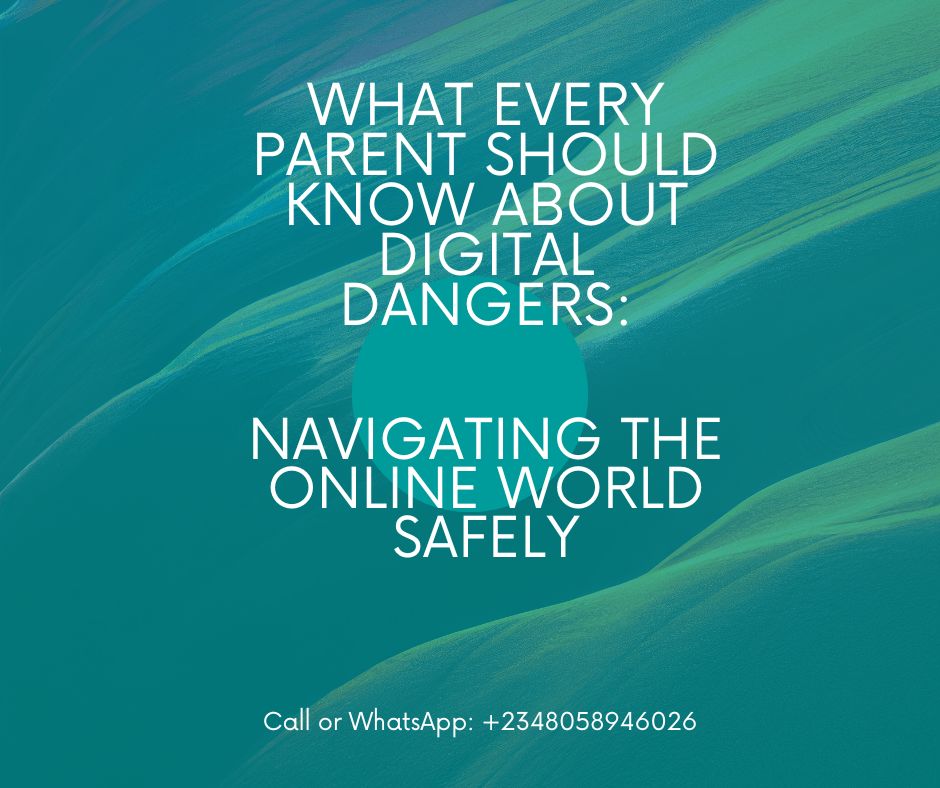What Every Parent Should Know About Digital Dangers: Navigating the Online World Safely
In today’s interconnected world, digital devices and the internet are an integral part of our children’s lives. From educational apps to social media and online gaming, the digital landscape offers incredible opportunities for learning, connection, and entertainment. However, it also presents a complex array of dangers that every parent needs to understand and address proactively.
This isn’t about fear-mongering; it’s about empowerment. By being informed and taking intentional steps, you can help your children navigate the online world safely and responsibly.
The Landscape of Digital Dangers: What Are We Talking About? Protect Your Kids Online.
The “digital dangers” encompass a wide range of risks. Here are some of the most prominent ones:
- Inappropriate Content: This includes exposure to violent, sexually explicit, hateful, or otherwise disturbing material that is not age-appropriate. This can be accidental (e.g., pop-up ads) or intentional (e.g., searching for forbidden content).
- Cyberbullying: The internet can be a platform for harassment, threats, and exclusion, often with a wider reach and more anonymity than traditional bullying. This can severely impact a child’s mental and emotional well-being.
- Online Predators and Grooming: This is perhaps the most frightening danger. Predators may pose as children or teens to build trust, collect personal information, and eventually attempt to meet the child in person or coerce them into sharing explicit content.
- Privacy Risks and Data Sharing: Children may unknowingly share too much personal information online, making them vulnerable to identity theft, scams, or unwanted contact. This includes photos, locations, school names, and contact details.
- Scams and Phishing: Children can be susceptible to online scams, fake prize offers, or phishing attempts that trick them into revealing sensitive information or making unauthorized purchases.
- Excessive Screen Time and Digital Addiction: While not a direct “danger” in the same way, uncontrolled screen time can lead to negative impacts on physical health, sleep patterns, academic performance, and social development.
- Impact on Mental Health: Constant exposure to social media can contribute to anxiety, depression, body image issues, and low self-esteem due to social comparison and the pressure to maintain an online persona.
Your Role as a Digital Parent: More Than Just Blocking
While parental control software can be a helpful tool, the most important “safety measure” is open communication and active involvement. Here’s how you can be an effective digital parent:
- Start the Conversation Early and Keep it Going:
- Don’t wait until there’s a problem. Begin discussing online safety with your children from their first interactions with devices.
- Create an environment where your child feels comfortable coming to you with any concerns, no matter how small or embarrassing. Assure them they won’t be punished for speaking up.
- Ask them about the sites they visit, the games they play, and who they interact with online. Listen more than you lecture.
- Set Clear Guidelines and Expectations:
- Work with your children to establish family rules for internet use, including screen time limits, appropriate content, and acceptable online behavior.
- Discuss privacy settings on social media and apps, and teach them not to share personal information with strangers.
- Reinforce the idea that what goes online, stays online – even if deleted.
- Be Aware and Get Involved:
- Familiarize yourself with the platforms, apps, and games your children use. Play with them, if appropriate, to understand the online environment they inhabit.
- Keep devices in common areas of the house, especially for younger children, to allow for easier supervision.
- Regularly check your credit card and phone bills for unfamiliar charges.
- Watch for warning signs of distress, secrecy, or sudden changes in online habits.
- Teach Digital Literacy and Critical Thinking:
- Help your children understand that not everything they see online is true. Teach them how to evaluate information and identify reliable sources.
- Encourage them to “think before they click” or share anything online.
- Explain the concept of digital footprint and online reputation.
- Address Cyberbullying Proactively:
- Educate your children about what cyberbullying is and how to respond (e.g., don’t respond, block, save evidence, tell a trusted adult).
- Emphasize kindness and empathy online, reminding them that words have power, even in a digital space.
- If your child is being cyberbullied, reassure them it’s not their fault and take steps to address it, including reporting to platforms and, if necessary, law enforcement.
- Utilize Technology Wisely (Parental Controls):
- Parental control software (like Bark, Qustodio, Norton Family, or Aura Parental Controls) can help filter content, manage screen time, and monitor activity. Research options and choose one that fits your family’s needs.
- However, remember these tools are a supplement, not a replacement, for open communication and active parenting.
- Model Responsible Digital Behavior:
- Your children learn by watching you. Be mindful of your own screen time habits, how you interact online, and what you share.
- Show them the importance of balancing online activities with offline experiences, physical activity, and face-to-face interactions.
The digital world is constantly evolving, and staying informed is an ongoing process. By fostering a trusting relationship with your children, setting clear boundaries, and educating them about online risks, you can empower them to navigate the digital landscape safely and confidently, allowing them to harness its benefits while minimizing its dangers.
For comments and questions send an email to simon@peculiarhouseholdoffaith.org
https://peculiarhouseholdoffaith.org/contact-peculiar-household-of-faith-church/
